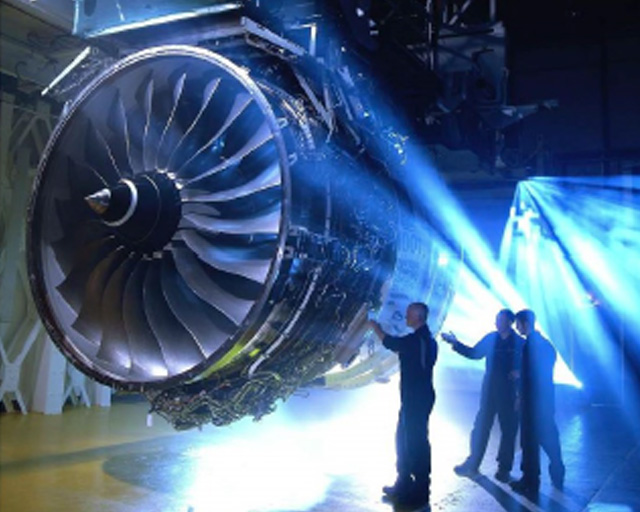Advancing Jet Engine Design Technologies
Birmingham City University (BCU)’s Knowledge Based Engineering (KBE) Lab is enabling improved design methods for the development of higher performing jet engines and bringing advances in design engineering automation technologies. These improved design methods are in collaboration with leading Aerospace manufacturer Rolls Royce Plc., and the company aims to develop significant economic benefits through the optimisation of design and manufacturing processes.
As a leading international company with a high reputation for excellence in engineering, Rolls- Royce has a keen interest in the development of design methods that support creativity and innovation while maintaining high assurance, reducing development time and minimising cost.
The collaboration with Rolls-Royce started in 2009 with a TSB funded Knowledge Based Partnership focused on demonstrating the benefits of applying KBE methods to modelling Rolls-Royce’s KEY systems, vital control parts of jet engines. The project resulted in several positive outcomes. It contributed to clearer understanding of the complex relationships between components in these systems, allowed larger space for exploring potential designs, enabled efficient integration, and facilitated deployment.
The collaboration with Rolls-Royce was substantially strengthened when the University was selected to enter into a commercial, research activity built around the £90m, Technology Strategy Board funded Strategic Investment in Low Carbon Engine Technology (SILOET) project in 2010.
This built on the achievements of the initial project by refining the models of KEY systems and developing service-based architectures to enhance relevant design automation processes. The new architectures integrate various KEY control systems through more efficient workflows of processes that embody specialised KBE concepts.
Since 2013, KBE Lab is involved in a follow up programme, SILOET2. As part of this, researchers have elicited holistic requirements and modelled engineering knowledge for an enterprise-level Platform Independent Knowledge Model (PIKM) system.

KBE research captures domain-based knowledge and integrates it into refined computational models with automated tools to enhance design processes for engineering complex systems. This research has contributed to important improvements in the design processes used by Rolls-Royce to achieve substantial benefits in terms of accuracy, efficiency and ease of design and innovation in the development of jet engines.
The first goal of this research is to provide a deeper understanding of the processes underlying the development lifecycle of sophisticated technological products, such as components of jet engines, from concepts through design and integration to manufacturing. The second is to engineer better automated tools to support design innovation and enhance product quality, whilst reducing cost and development time.
The research exploits the huge potential of virtualisation to create a supporting environment for virtual product development. This relies on careful representation, manipulation and management of reusable engineering knowledge. The representation of product characteristics and engineering knowledge enables the deployment of mature software engineering methods to support the development of complex engineering systems.
KBE Lab is currently involved in a number of PhD projects, investigating novel methods for developing engineering process models, and technology selection.
The potential benefits of adopting this approach are numerous; among which are rapid creation of detailed designs, and ability to examine their properties through extensive low-cost simulations as opposed to slow and expensive testing of real product prototypes. This frees engineers from the burden of routine tasks and allows them to focus on the creative and innovative parts of the design process. The approach also allows the exploration of larger space of design options than would otherwise be possible.
The collaboration with Rolls Royce has shown that significant economic benefits can be achieved. It can be seen that the use of KBE can reduce the design to make cycle by 40%, allowing more solutions to be considered within the same timeframe. The wider reaching impact will be innovative design engineering solutions, providing competitive and sustainable engine technologies.
